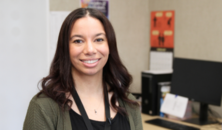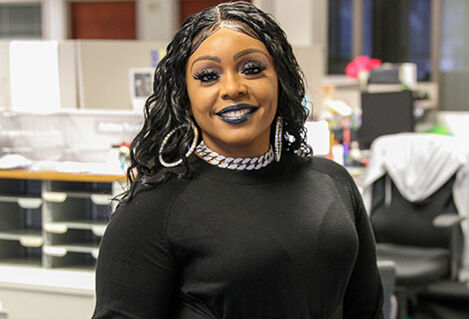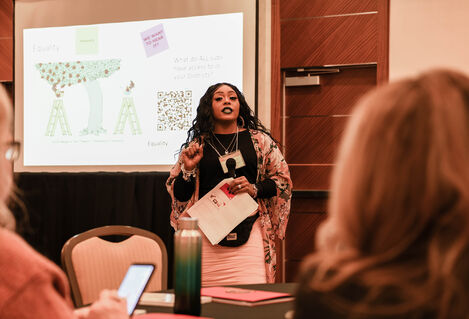Filter Articles
Subscribe to our Blog
Be curious and ask why
Blaire Penry, Washington state's 2024 Teacher of the Year, recognizes that when educators are authentic with their students, students are authentic in return. "Students know fake and don't respond to fake," says Penry.
"When teachers are real with students, students are real in return and more willing to be creative and take risks."
Penry is currently an instructional specialist in the Auburn School District, but previously, was an online career and Technical Education (CTE) and electives teacher for Auburn Online, which was her role when she was named the state's top educator. Penry explains that in an online learning environment, authenticity must be intentional and a focus of classroom practice.
"This program that was started in response to the pandemic grew to be a program to meet students and their families where they were and in a way that they needed."
In a time when many educators were glad to return to a traditional classroom after distance learning due to the COVID-19 pandemic, Penry saw online learning as a chance to be innovative and disruptive.
"Teaching online is an opportunity to meet students in a different way."
As an educator of color, Penry has not always felt seen, valued or heard.
"I don’t always feel valued within the education system," she says and recognizes that her students feel the same.
Penry credits virtual teaching with transforming her practice to better reflect her students. "I was forced to really look at my curriculum and look for what voices were not being seen or heard and whose lens the curriculum was coming from." Teaching online allowed Penry to be creative and disrupt traditional practices that did not meet the needs of every student, especially students of color. Reflection is a critical element of Penry's teaching.

"We need to examine our own stories and our own teaching and reflect on our own educational journey to see how that is playing out in our classrooms," she says.
Penry's experiences have shown her that educators must value and bridge what they are teaching with the lived experiences of the students in their classrooms.
"We have to ask questions and be unafraid so that we can connect with all of our students," she explains.
Penry also views online learning as a vehicle for creativity and for utilizing technology in new ways.
"Technology is always moving forward," she explains. "When we don't teach students how to use technology, we're doing them a disservice."
Decision-makers are critical in this endeavor.
"When I tell people I'm an online teacher they roll their eyes," Penry says. People have preconceived ideas about online learning and the students who access that type of program, she explains.
In Penry's experience the reality is that students are thriving and building rich community in the online environment. Penry believes decision-makers must shine a spotlight on programs like hers that are working for students, because it’s a matter of equity.
"We can't just have the words equity, diversity and inclusion in our mission statements," she says. "We need to take the time to ensure that equity is actually happening. It can’t just be said. It has to be acted."
Online education programs, she says, are equity in action because they expand access to public education to more students.
Outside of school, Penry spends time with family and her 4-year-old son.
"He is inquisitive and funny and very talented and lately he’s been in the why phase and sometimes that is really overwhelming," she says. "But there are so many times when he asks why and it is a really good question."
That inquisitiveness is a reminder to her that being curious and not being afraid to ask "why" is important. "I am asking more questions," she says. "I am inspired to grow."
-

A platform to share the experiences of all ESPs
10/24/2023Congratulations to Renton's Aneeka Ferrell, 2023 WEA Education Support Professional of the Year 2023 Washington Education Association Education Support Professional of the Year Aneeka Ferrell hopes to use her platform to share the experiences of ESPs. "I'm...Read More -

2023 Superintendent's High School Art Show
06/05/2023Congratulations to Mia Sanchez - a senior at Grandview High School in the Grandview School District - whose artwork Life in Line was selected by WEA as our top choice across the state...Read More -

SUBposium 2023
05/11/2023Earlier this month, school district and association staff joined together to share and collaborate ways they support substitutes across the state. WEA's SUBposium was an opportunity to focus on leaders who are providing support and...Read More